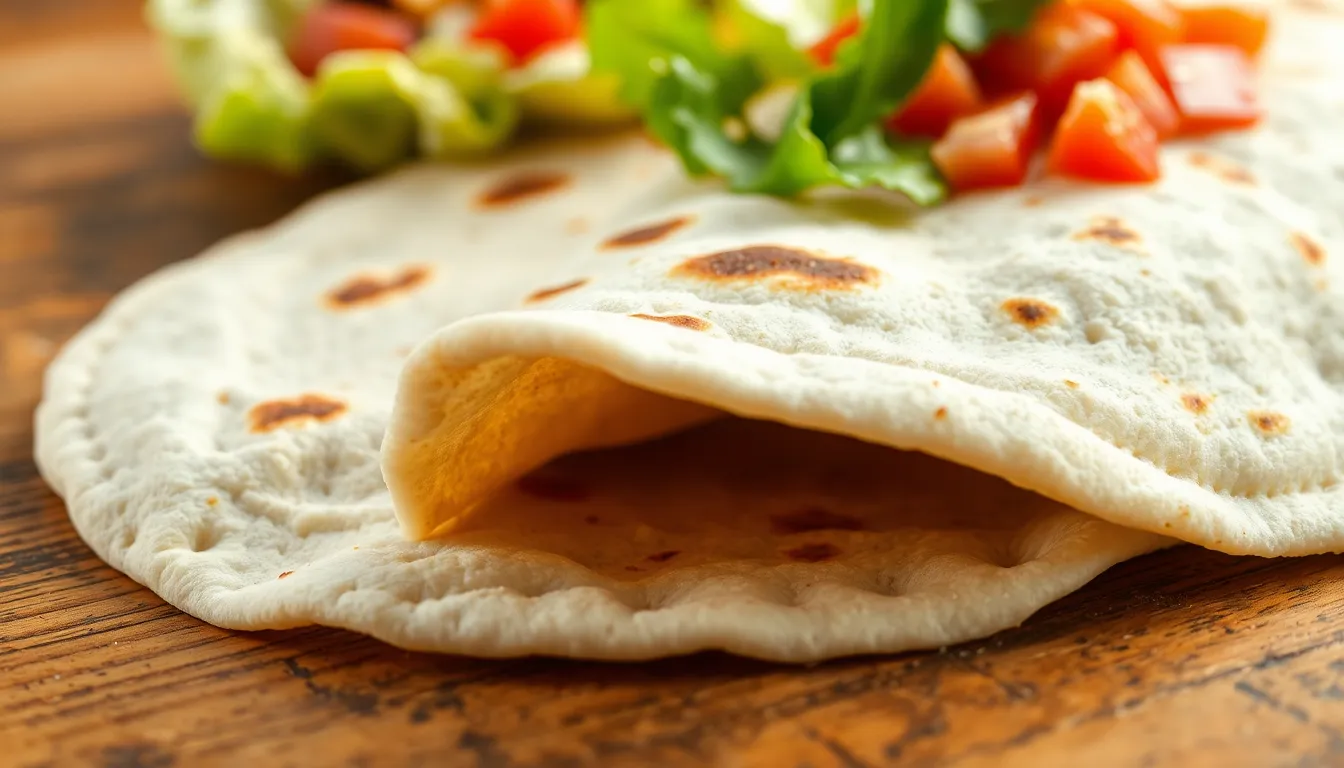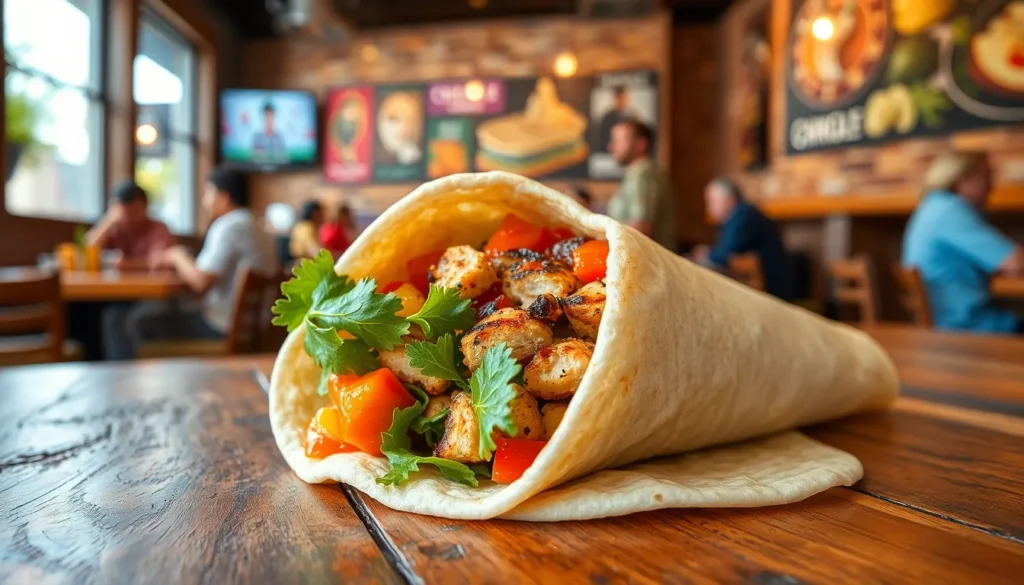When it comes to Chipotle, the tortilla is the unsung hero of every burrito and taco masterpiece. But have you ever wondered how many calories are hiding in that warm, fluffy embrace? It’s like the secret ingredient that makes your meal delicious yet slightly guilty.
Table of Contents
ToggleUnderstanding Chipotle Tortillas
Chipotle’s tortillas play a crucial role in the overall dining experience. These tortillas not only enhance flavor but also influence the meal’s calorie count.
Types of Tortillas Offered
Chipotle provides several types of tortillas. The standard flour tortilla features a soft and chewy texture, while the corn tortilla offers a robust, gluten-free option. Additionally, customers can request a crispy taco shell for a satisfying crunch. Each type serves a distinct purpose within the menu, delivering unique taste experiences.
Ingredients and Nutritional Content
Key ingredients define Chipotle’s tortillas. Flour tortillas primarily contain flour, water, and salt. Corn tortillas consist of masa harina, water, and lime, making them gluten-free. The nutritional content varies across options, with flour tortillas generally containing about 300 calories each, while corn tortillas have around 50 calories each. Understanding these differences aids in making informed meal choices.
Caloric Breakdown

Understanding the calorie content of Chipotle’s tortillas can guide meal choices more effectively. The standard flour tortilla contributes significantly to a burrito or taco’s caloric total.
Standard Tortilla Calorie Count
A standard flour tortilla from Chipotle contains about 300 calories. Made with flour, water, and salt, its size adds to the calorie count. The soft and chewy texture often leaves diners satisfied, but caloric awareness is essential when making meal decisions. In contrast, a corn tortilla offers a lighter alternative with approximately 50 calories. This gluten-free option provides flavor without packing on the calories.
Comparisons with Other Tortillas
When comparing Chipotle’s offerings, the crispy taco shell has the highest calorie count among options. Each crispy shell contains around 220 calories, complementing the flavor of the fillings. In contrast, the corn tortilla remains the most calorie-friendly choice, allowing for a guilt-free indulgence. Thus, customers can enjoy a variety of experiences, balancing taste and nutritional considerations based on tortilla choices. Understanding these calorie counts helps maintain dietary goals while enjoying meals.
Factors Affecting Caloric Content
Caloric content in Chipotle tortillas varies based on several factors. Understanding these influences can help customers make better meal choices.
Portion Size Considerations
Portion size plays a significant role in determining calorie count. A standard flour tortilla typically holds about 300 calories. Choosing a smaller tortilla reduces calorie intake, while larger options lead to higher totals. Similarly, selecting corn tortillas, which contain around 50 calories, allows for a lighter meal. Additionally, the amount of tortilla used can differ between orders, impacting the final calorie count.
Additional Ingredients and Toppings
Additional ingredients and toppings drastically affect overall caloric content. Adding guacamole or cheese not only enhances flavor but also increases the calorie total by 230 and 110 calories, respectively. Besides, rich sauces add extra calories; for instance, a typical serving of sour cream adds about 120 calories. The choice of meats also impacts this; chicken, steak, and barbacoa each have varying calorie content. Combining these factors while selecting menu items helps customers align meals with their dietary goals.
Health Considerations
Understanding the caloric content of Chipotle’s tortillas is essential for health-conscious diners. Tortillas serve as a cornerstone of meal composition, influencing both flavor and calorie intake.
Dietary Restrictions and Considerations
Dieters must account for specific dietary restrictions when choosing tortillas. Chipotle offers gluten-free corn tortillas, catering to those with gluten sensitivities. Nutritionally, flour tortillas contain around 300 calories, which may not fit into every diet plan. Corn tortillas, at approximately 50 calories each, serve as a lighter alternative. Individuals managing carbohydrate intake might prefer the corn option. Those requiring allergen information should review ingredient sources, as items like dairy toppings can complicate dietary choices. Lingering questions about sodium content also prompt careful consideration. Customers should assess their dietary needs alongside the nutritional breakdown provided.
Balancing Your Meal Choices
Balancing meal components becomes vital for achieving dietary goals. Understanding how tortillas fit into overall caloric totals can assist in meal planning. Choosing smaller tortillas helps in reducing calorie intake effectively. Adding toppings such as guacamole or cheese increases meal richness but also caloric content significantly, at 230 and 110 calories respectively. Sauce options contribute additional calories, impacting the total. Evaluating the interplay between various toppings and tortilla types allows diners to create satisfying and healthier meals. Opting for lighter ingredients further enhances meal enjoyment without excessive calorie spikes. Keeping these factors in mind supports informed meal decisions at Chipotle.
Understanding the caloric content of Chipotle’s tortillas is essential for making informed dining choices. With options ranging from the hearty flour tortilla to the lighter corn variety, diners can easily tailor their meals to fit their dietary needs.
By considering portion sizes and topping selections, individuals can enjoy flavorful meals without compromising their health goals. Chipotle’s commitment to offering gluten-free options further supports those with dietary restrictions.
Ultimately, being mindful of calorie counts and meal composition allows for a satisfying dining experience that aligns with personal nutrition objectives.



